Related Research Articles

Hepatitis C is an infectious disease caused by the hepatitis C virus (HCV) that primarily affects the liver; it is a type of viral hepatitis. During the initial infection period, people often have mild or no symptoms. Early symptoms can include fever, dark urine, abdominal pain, and yellow tinged skin. The virus persists in the liver, becoming chronic, in about 70% of those initially infected. Early on, chronic infection typically has no symptoms. Over many years however, it often leads to liver disease and occasionally cirrhosis. In some cases, those with cirrhosis will develop serious complications such as liver failure, liver cancer, or dilated blood vessels in the esophagus and stomach.
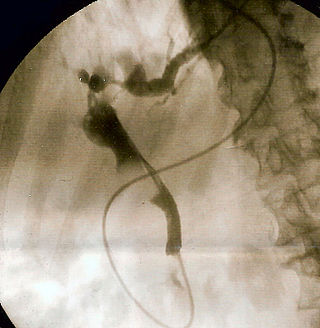
Hepatology is the branch of medicine that incorporates the study of liver, gallbladder, biliary tree, and pancreas as well as management of their disorders. Although traditionally considered a sub-specialty of gastroenterology, rapid expansion has led in some countries to doctors specializing solely on this area, who are called hepatologists.
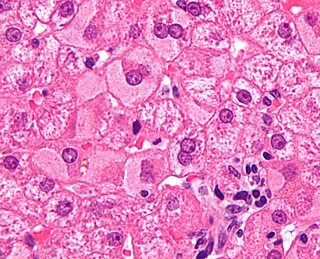
Viral hepatitis is liver inflammation due to a viral infection. It may present in acute form as a recent infection with relatively rapid onset, or in chronic form, typically progressing from a long-lasting asymptomatic condition up to a decompensated hepatic disease and hepatocellular carcinoma (HCC).

The hepatitis C virus (HCV) is a small, enveloped, positive-sense single-stranded RNA virus of the family Flaviviridae. The hepatitis C virus is the cause of hepatitis C and some cancers such as liver cancer and lymphomas in humans.

Chiron Corporation was an American multinational biotechnology firm founded in 1981, based in Emeryville, California, that was acquired by Novartis on April 20, 2006. It had offices and facilities in eighteen countries on five continents. Chiron's business and research was in three main areas: biopharmaceuticals, vaccines, and blood testing. Chiron's vaccines and blood testing units were combined to form Novartis Vaccines and Diagnostics, while Chiron BioPharmaceuticals was integrated into Novartis Pharmaceuticals. In 2014, Novartis completed the sale of its blood transfusion diagnostics unit to Grifols and announced agreements for the sale of its vaccines unit to GlaxoSmithKline.
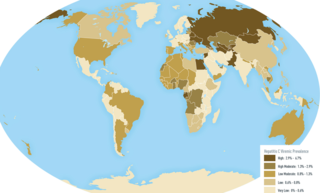
An oncovirus or oncogenic virus is a virus that can cause cancer. This term originated from studies of acutely transforming retroviruses in the 1950–60s, when the term oncornaviruses was used to denote their RNA virus origin. With the letters RNA removed, it now refers to any virus with a DNA or RNA genome causing cancer and is synonymous with tumor virus or cancer virus. The vast majority of human and animal viruses do not cause cancer, probably because of longstanding co-evolution between the virus and its host. Oncoviruses have been important not only in epidemiology, but also in investigations of cell cycle control mechanisms such as the retinoblastoma protein.
Fox Chase Cancer Center is a National Cancer Institute-designated Comprehensive Cancer Center research facility and hospital located in the Fox Chase section of Philadelphia, Pennsylvania, United States. The main facilities of the center are located on property adjoining Burholme Park. The center is part of the Temple University Health System (TUHS) and specializes in the treatment and prevention of cancer.

Harvey James Alter is an American medical researcher, virologist, physician and Nobel Prize laureate, who is best known for his work that led to the discovery of the hepatitis C virus. Alter is the former chief of the infectious disease section and the associate director for research of the Department of Transfusion Medicine at the Warren Grant Magnuson Clinical Center in the National Institutes of Health (NIH) in Bethesda, Maryland. In the mid-1970s, Alter and his research team demonstrated that most post-transfusion hepatitis cases were not due to hepatitis A or hepatitis B viruses. Working independently, Alter and Edward Tabor, a scientist at the U.S. Food and Drug Administration, proved through transmission studies in chimpanzees that a new form of hepatitis, initially called "non-A, non-B hepatitis" caused the infections, and that the causative agent was probably a virus. This work eventually led to the discovery of the hepatitis C virus in 1988, for which he shared the Nobel Prize in Physiology or Medicine in 2020 along with Michael Houghton and Charles M. Rice.
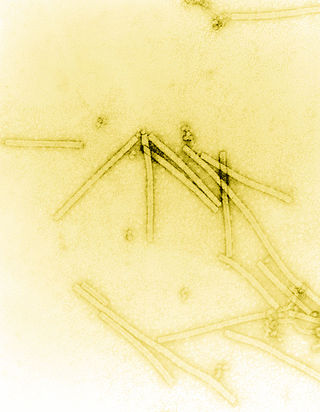
The history of virology – the scientific study of viruses and the infections they cause – began in the closing years of the 19th century. Although Edward Jenner and Louis Pasteur developed the first vaccines to protect against viral infections, they did not know that viruses existed. The first evidence of the existence of viruses came from experiments with filters that had pores small enough to retain bacteria. In 1892, Dmitri Ivanovsky used one of these filters to show that sap from a diseased tobacco plant remained infectious to healthy tobacco plants despite having been filtered. Martinus Beijerinck called the filtered, infectious substance a "virus" and this discovery is considered to be the beginning of virology.
Ledipasvir is a drug for the treatment of hepatitis C that was developed by Gilead Sciences. After completing Phase III clinical trials, on February 10, 2014, Gilead filed for U.S. approval of a ledipasvir/sofosbuvir fixed-dose combination tablet for genotype 1 hepatitis C. The ledipasvir/sofosbuvir combination is a direct-acting antiviral agent that interferes with HCV replication and can be used to treat patients with genotypes 1a or 1b without PEG-interferon or ribavirin.

Sir Michael Houghton is a British scientist and Nobel Prize laureate. Along with Qui-Lim Choo, George Kuo and Daniel W. Bradley, he co-discovered Hepatitis C in 1989. He also co-discovered the Hepatitis D genome in 1986. The discovery of the Hepatitis C virus (HCV) led to the rapid development of diagnostic reagents to detect HCV in blood supplies, which has reduced the risk of acquiring HCV through blood transfusion from one in three to about one in two million. It is estimated that antibody testing has prevented at least 40,000 new infections per year in the US alone and many more worldwide.
Qui-Lim Choo is a Singapore-born scientist, who along with Michael Houghton, George Kuo and Daniel W. Bradley, co-discovered and cloned Hepatitis C in 1989. He also co-discovered the Hepatitis D genome in 1986. The discovery of Hepatitis C led to the rapid development of diagnostic reagents to detect Hepatitis C virus in blood supplies which has reduced the risk of acquiring hepatitis C through blood transfusion from one in three to about one in two million. It is estimated that antibody testing has prevented at least 40,000 new infections per year in the US alone and many more worldwide.
Daniel W. Bradley is an American virologist who, along with Michael Houghton, Qui-Lim Choo and George Kuo at Chiron Corporation, worked to help isolate the Hepatitis C virus in 1989.
Stephen Mark Feinstone is a virologist who, together with Albert Kapikian and Robert Purcell, co-identified the Hepatitis A virus (HAV) in 1973.
The Karl Landsteiner Memorial Award is a scientific award given by the American Association of Blood Banks (AABB) to scientists with "an international reputation in transfusion medicine or cellular therapies" "whose original research resulted in an important contribution to the body of scientific knowledge". Recipients give a lecture at the AABB Annual Meeting and receive a $7,500 honorarium. The prize was initiated in 1954 to honor Karl Landsteiner, whose research laid the foundation for modern blood transfusion therapy. In 2023, the AABB renamed the Karl Landsteiner Memorial Award as the Landsteiner-Alter Award in honor of both Karl Landsteiner and Harvey J. Alter.
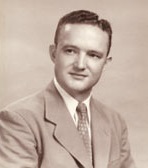
Lacy Rasco Overby was a virologist known for his contributions to Hepatitis B and Hepatitis C research.

Charles Moen Rice is an American virologist and Nobel Prize laureate whose main area of research is the hepatitis C virus. He is a professor of virology at the Rockefeller University in New York City and an adjunct professor at Cornell University and Washington University School of Medicine. At the time of the award he was a faculty at Rockefeller.
The William Beaumont Prize is a scientific award given by the American Gastroenterological Association (AGA) to scientists who have "made a major contribution that has significantly advanced care of patients with digestive diseases through clinical or translational research". Recipients receive a $5,000 honorarium. The prize was initiated in 1976.
The 2020 Nobel Prize in Physiology or Medicine was awarded to the American virologists Harvey J. Alter, Michael Houghton and Charles M. Rice "for the discovery of Hepatitis C virus." During the award ceremony on December 10, 2020, Prof. Gunilla Karlsson-Hedestam said:
"The discovery of the Hepatitis C virus by this year’s Laureates laid the foundation for our current understanding about how the virus survives in its niche during the long chronic phase of the infection, and how liver disease develops. And importantly, it led to the development of highly effective anti-viral medicines that now cure the infection in almost all treated persons."
References
- ↑ Choo QL, Kuo G, Weiner AJ, Overby LR, Bradley DW, Houghton M (April 1989). "Isolation of a cDNA clone derived from a blood-borne non-A, non-B viral hepatitis genome". Science. 244 (4902): 359–62. Bibcode:1989Sci...244..359C. CiteSeerX 10.1.1.469.3592 . doi:10.1126/science.2523562. PMID 2523562.
- ↑ "Out of the Shadows - Proto Magazine - Massachusetts General Hospital". protomag.com. Archived from the original on 2014-04-07. Retrieved 2014-04-04.
- ↑ "The unsung heroes of the Nobel-winning hepatitis C discovery". Nature . Retrieved 26 October 2020.
- ↑ "Opinion: Nobel-worthy discovery right in our backyard". Canadian for Health Research. Retrieved 4 September 2016.
- ↑ "Science world abuzz as virologist turns down Gairdner award". The Globe and Mail . Retrieved 10 September 2016.
- ↑ "List of Past AABB Award Recipients". AABB . Retrieved 4 October 2016.
- ↑ "William Beaumont Prize". American Gastroenterological Association . Retrieved 4 October 2016.
- ↑ Boyer, J.L; Blum, H.E; Maier, K.P; Sauerbruch, T.; Stalder, G.A (2001-03-31). Liver Cirrhosis and Its Development - Google Books. ISBN 9780792387602 . Retrieved 2014-01-12.
- ↑ "Irene C Kuo, M.D., Associate Professor of Ophthalmology". Johns Hopkins Medicine. Retrieved 2020-10-05.
- ↑ "Dr. Irene Kuo and Dr. Carson Chow". The New York Times. 2005-04-24. ISSN 0362-4331 . Retrieved 2020-10-05.